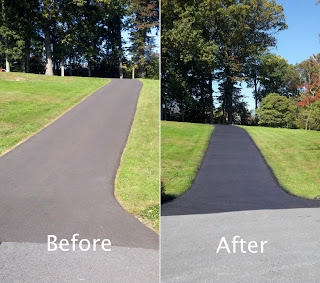Asphalt is one of the most sustainable materials for constructing pavements. From the production of the paving material, to the placement of the pavement on the road, to rehabilitation, through reuse/recycling, asphalt pavements minimize impact on the environment.
 |
| Asphalt Paving Has Many Benefits |
Reuse/Recycling
The asphalt industry reuses and recycles nearly 100 million tons of its own product every year, making it America’s number one recycler.
Reclaimed asphalt pavement (RAP) actually reduces the amount of virgin asphalt cement needed for constructing new roadways. When RAP is incorporated into new pavement, the asphalt cement in the old pavement is reactivated, becoming part of the glue that holds the new pavement together and replacing some of the virgin asphalt cement that would otherwise be required. This makes the final product less vulnerable to market fluctuations in raw material prices while conserving precious natural resources.
Other materials – including rubber from used tires, glass, and asphalt roofing shingles – are recycled into asphalt pavements.
Public Safety - Asphalt Reduces Crashes
Smooth asphalt roads give vehicle tires superior contact with the road, improving safety. Opengraded asphalt surfaces allow rainwater to drain through the pavement surface, reducing the amount of splash and spray kicked up by vehicles.
Resurfacing with open-graded asphalt has been shown to reduce crashes and fatalities on highways.
Performance
The road doesn’t wear out Perpetual Pavements constructed from asphalt are the ultimate in sustainability. When appropriately designed and constructed, the road itself doesn’t wear out. For maintenance, the top layer is removed for reuse/recycling, then replaced quickly without causing traffic congestion.
Noise Reduction
Asphalt is the quiet pavement. Studies show that the noise-reducing properties of asphalt last for many years. Noise reductions of 3 to 10 dB(a) are common. Reducing noise by 3 dB(a) is about the same as doubling the distance from the road to the listener, or reducing traffic volume by 50 percent.
Traffic Relief - Asphalt Helps to Moves Traffic Along
In crowded urban areas, where closing a road for rehabilitation or reconstruction would dump increased traffic on to neighboring routes, asphalt is the answer. Highways and roads can be milled for reuse/recycling, then overlaid, during off-peak hours. An entire freeway can be resurfaced without commuters ever being inconvenienced. In congested conditions, cars and trucks consume fuel and produce excess greenhouse gases.
Asphalt’s speed of construction allows planners and managers a way to fix congestion hot spots and bottlenecks, quickly and cost-effectively.
Water Quality
Stormwater management with porous asphalt Porous asphalt pavement systems are recognized by the U.S. EPA as a best management practice (BMP) for stormwater management. When used for parking lots, roads, walking/biking paths, and other applications, porous pavements can turn runoff into infiltration; restore the hydrology of a site, or even improve it; improve water quality; and eliminate the need for detention basins.
Environmental Applications
Drinking water reservoirs are often lined with asphalt, and asphalt cement is used to line water pipes that supply potable water to humans.
Landfills are often lined and capped with asphalt. Some state fish and wildlife agencies even use asphalt pavement to line their fish rearing ponds.
Cleaner Air, Cool Cities
Asphalt plants are environmentally sound Emissions from asphalt plants, including greenhouse gases, are very low and well-controlled. Since 1970, the asphalt industry has decreased total emissions by 97 percent while increasing production by 250 percent. Emissions from asphalt plants are so low, the EPA removed asphalt plants from its list of major sources of hazardous air pollutants.
Cool cities
The urban heat island effect is not a black and white issue. Not just color and reflectivity but also thickness, density, and heat capacity all play a role in pavement heat retention. Another consideration is that highly reflective pavements pose potential safety and health risks because of increases in glare and ground-level UV radiation scatter.
Road Readie Paving - Barrie / Simoce County -
www.roadreadiepaving.com - Our commitment is to deliver an exceptional product at a competitive cost. Road Readie Paving will take care of all of your paving needs- commercial, industrial or residential. With over 25 years of experience, you can be confident in our expertise and professionally trained staff. We will customize each project to suit your individual needs. With Road Readie Paving, you can trust that we will make your asphalt vision a reality.
Source:
http://www.asphaltpavement.org/images/stories/ps-35web.pdf































